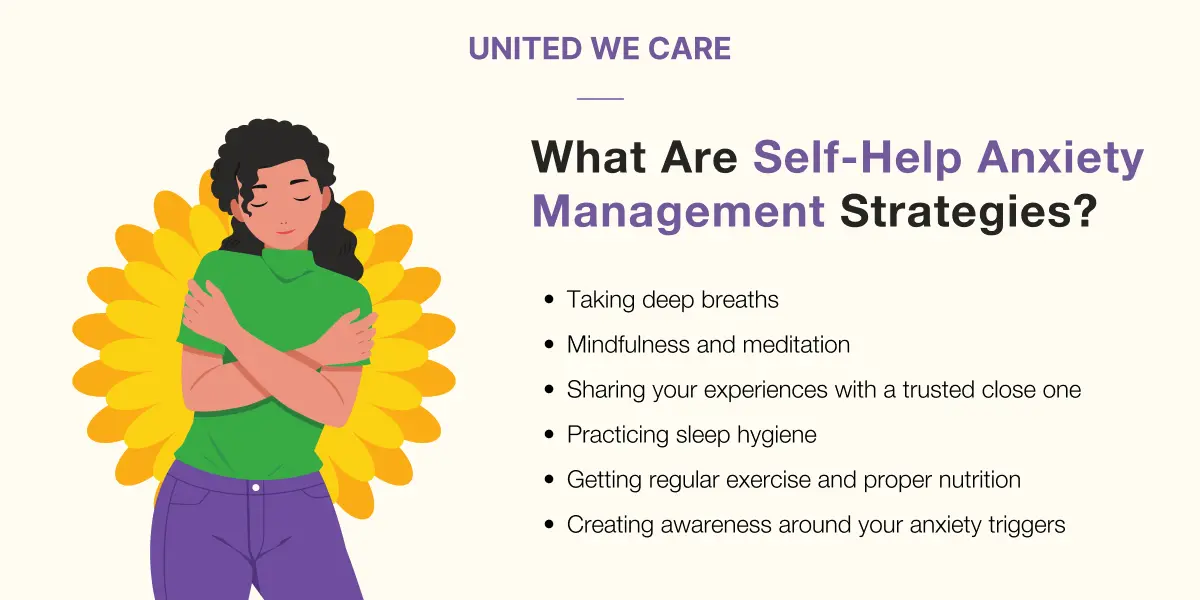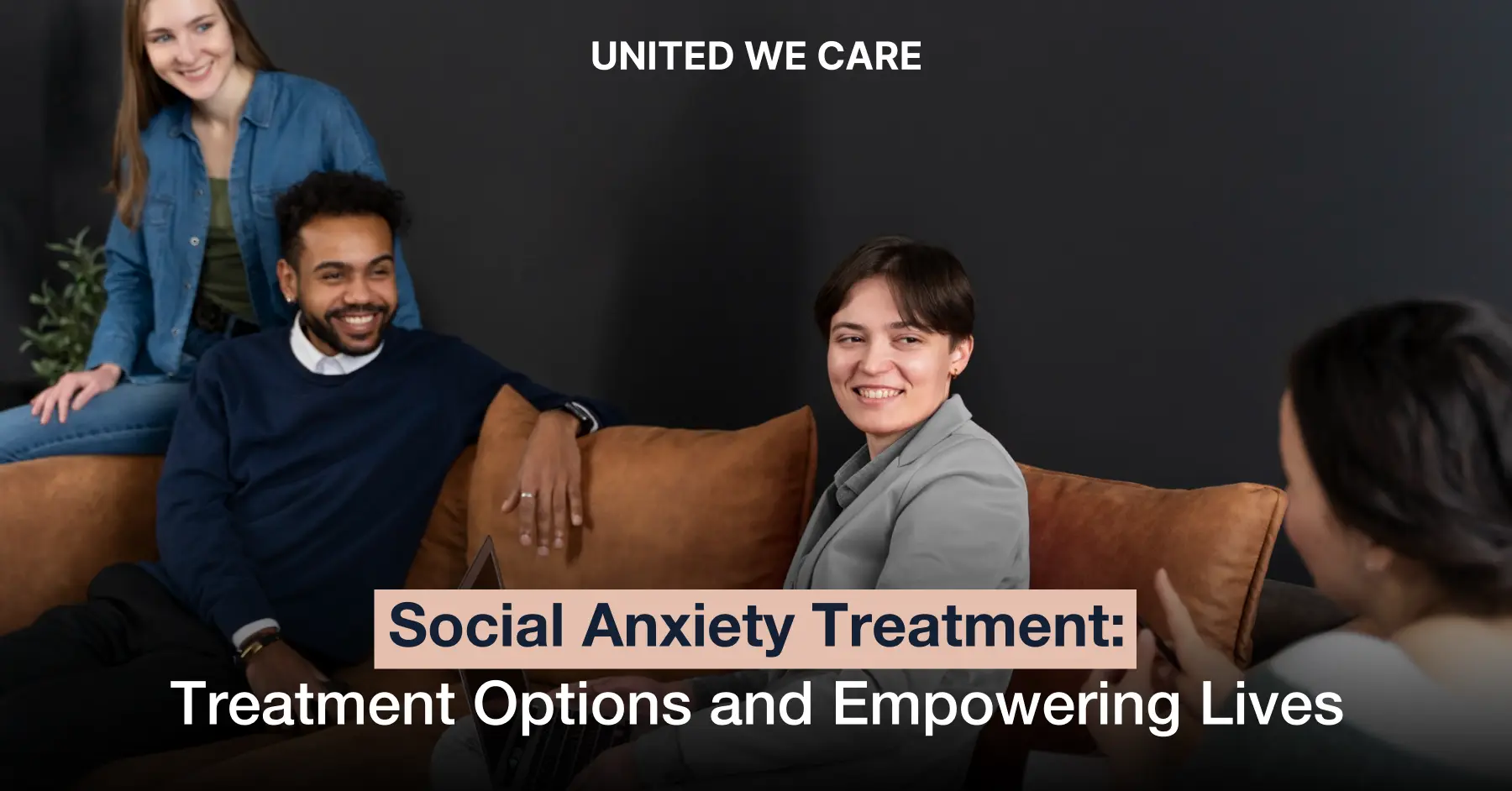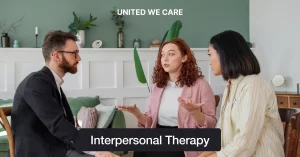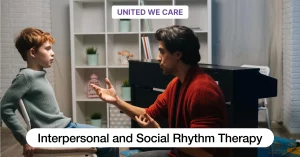Introduction
Approximately 1 in 3 adults are affected by an anxiety disorder at some stage in their life. [1] Factors such as the kind of society we live in, our genetic predisposition, and the way we’ve been brought up can contribute to anxiety. A common type of anxiety disorder is social anxiety disorder (SAD). Effective options for social anxiety treatment are available today.
Fear is a natural emotional response to an immediate threat. However, this fear becomes concerning when it is out of proportion and in anticipation of a future event. This is known as anxiety. Feeling overly anxious can hinder our ability to function normally as we may start to avoid situations that can trigger our anxiety.
In the case of social anxiety, persistent fear of interacting with people or being judged or embarrassed may result in the avoidance of basic and necessary tasks such as getting groceries or showing up for a work presentation. In this blog, we’ll discuss social anxiety, its treatment options, and how seeking help can empower your life.
What is social anxiety?
Imagine this: You’re dreading the team meeting at work. You couldn’t get enough sleep the night before, and during the meeting, your hands kept trembling as you went on pitching your ideas with a shaky voice. Despite your ideas being well received, you can’t shake off the feeling that you embarrassed yourself. You feel dissatisfied with yourself and your job. A few days later, you have a school reunion coming up. Again, you’re anxious about your peers judging you and your journey; hence, you decide against attending it altogether. You end up feeling lonely.
Do you often find yourself in such situations? You may have social anxiety.
Social anxiety disorder, also known as social phobia, is characterized by an overwhelming, persistent fear of social interactions and negative evaluations by others, hence resulting in avoidance of social settings.[2] This can have a detrimental effect on your well-being as it can affect your work as well as your ability to form and maintain social relationships.
Common situations that can trigger your social anxiety include talking to strangers, making eye contact, asking a question, using public restrooms, job interviews, parties, and eating in public.
Symptoms of social anxiety disorder
Due to its nature and the intensity of distress caused, social anxiety is different from shyness. If you’re shy, you might feel uncomfortable in a social situation at first but blend in over time. However, social anxiety is accompanied by intense physical and psychological symptoms, such as:
- Trembling or shaking of hands and body, or having a rigid stance
- Difficulty in speaking
- Rapid breathing and heart rate
- Sweating and blushing
- Stomach pain and nausea
- Feeling self-doubt and engaging in negative self-talk
- Either avoiding or wanting to flee the social situation
- Using alcohol or other substances to face a social situation [3]
What Are The Social Anxiety Treatment Options?
Social anxiety can be treated using behavioral therapies, medication, and self-help anxiety management strategies. Depending on what you struggle with, your doctor or psychologist will recommend a treatment or combination of treatments that are most effective for your recovery from social phobia.
Behavioral therapies
With cognitive-behavioral therapy (CBT), you can learn to recognize and question the thought patterns that aren’t working for you and swap them out for more practical and uplifting ones that support you in the way you feel and behave in a social situation. [4]
Exposure therapy is a behavioral therapy that is frequently used and is effective in the treatment of social anxiety. It involves facing your fears in a safe and clinically controlled environment, which can help reduce your fear and avoidance of social situations over time.
Social skills training (SST) includes modeling socially appropriate behavior, role-playing, and then applying it in real-life situations. [5]
Medication
Always let a healthcare provider evaluate your symptoms and condition and prescribe you the right medication if needed. Do not self-medicate. Selective serotonin reuptake inhibitors (SSRIs) are the first line of medication options that can help regulate your anxiety and mood. [6] If you have performance anxiety in a social setting, your doctor might prescribe you with beta-blockers. These medications are effective in treating fear of a specific event occurring at a specific time, such as giving a speech. However, they are not helpful for the general treatment of SAD.
Self-help anxiety management strategies
To support the treatment recommended by your doctor, you can learn relaxation techniques for managing your social anxiety, such as:

- Taking deep breaths
- Mindfulness and meditation
- Sharing your experiences with a trusted close one
- Practicing sleep hygiene
- Getting regular exercise and proper nutrition
- Creating awareness around your anxiety triggers
How Does Social Anxiety Treatment Empower Lives?
Social anxiety can take over your life and interfere with your daily duties and responsibilities, as well as things you enjoy. When you seek treatment for your social anxiety, you take back your control over your life and choices. You gain confidence as you conquer your fears, improve your ability to interact and form authentic connections and open yourself up to new experiences and opportunities. With the right treatment, you can go about your daily life with more ease and experience better overall well-being.
Conclusion
Social anxiety disorder can be debilitating as overwhelming fear of social interaction and judgment from others can result in avoidance behaviors, which can hinder daily functioning. Behavioral therapies such as CBT, exposure therapy, and SST are effective in the treatment of SAD. You may also be prescribed medication to treat accompanying symptoms of anxiety and depression. If you or someone you know has overwhelming social anxiety, consider seeking professional help. Book a session with one of our mental health experts at Kareify, who can help you develop healthier coping strategies for your fears.
References
[1] American Psychiatric Association, “What Are Anxiety Disorders?” [Online]. Available: https://www.psychiatry.org/patients-families/anxiety-disorders/what-are-anxiety-disorders#. Accessed: Dec. 21, 2023.
[2] Schneier, F., & Goldmark, J. (2015). Social anxiety disorder. In D. J. Stein & B. Vythilingum (Eds.), Anxiety disorders and gender (pp. 49–67). Springer International Publishing/Springer Nature. Available: https://doi.org/10.1007/978-3-319-13060-6_3. Accessed: Dec. 21, 2023.
[3] K. Walukevich-Dienst, B. H. Calhoun, A. M. Fairlie, J. M. Cadigan, M. E. Patrick, and C. M. Lee, “Using substances to cope with social anxiety: Associations with use and consequences in daily life,” Psychology of Addictive Behaviors, vol. 37, no. 4, pp. 581–591, 2023. [Online]. Available: https://doi.org/10.1037/adb0000899. Accessed: Dec. 21, 2023.
[4] S. C. Hayes and S. G. Hofmann, Process-Based CBT: The Science and Core Clinical Competencies of Cognitive Behavioural Therapy. [Online]. Available: https://books.google.co.in/books?id=J0tHDgAAQBAJ. Accessed: Nov. 21, 2023.
[5] D. C. Beidel, C. A. Alfano, M. J. Kofler, P. A. Rao, L. Scharfstein, and N. W. Sarver, “The impact of social skills training for social anxiety disorder: A randomized controlled trial,” Journal of Anxiety Disorders, vol. 28, no. 8, pp. 908-918, 2014. [Online]. Available: https://doi.org/10.1016/j.janxdis.2014.09.016. Accessed: Dec. 21, 2023.
[6] Carlos Blanco M.D., Ph.D., Franklin R. Schneier M.D., Andrew Schmidt C.S.W., Carmen-Rosa Blanco-Jerez M.D., Randall D. Marshall M.D., Arturo Sánchez-Lacay M.D., Michael R. Liebowitz M.D, “Pharmacological treatment of social anxiety disorder: A meta-analysis,” in Depression and Anxiety, vol. 18, no. 1, pp. 29-40, 2003. [Online]. Available: https://onlinelibrary.wiley.com/doi/abs/10.1002/da.10096. Accessed: Dec. 21, 2023.





